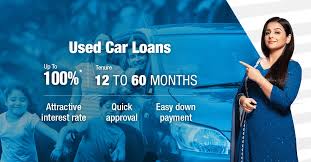Notifications

8 minutes, 6 seconds
-35 Views 0 Comments 0 Likes 0 Reviews

In the complex matrix of personal finance, a good credit score is often seen as a golden ticket—especially when applying for a used car loan. Yet, many are startled when lenders still reject their application, leaving them puzzled and frustrated. While a healthy CIBIL score opens doors, it's not the sole determinant in loan approvals. Lenders look beyond the numbers to evaluate overall used car loan eligibility, sometimes denying seemingly ideal applicants. Understanding why this happens is essential—and knowing how to find a reliable lender like Ambit Finvest can make all the difference.

Contrary to popular belief, used car loan eligibility is not solely based on your credit score. Lenders assess multiple parameters to determine your ability to repay. This includes:
Age of the applicant (usually 21–65 years)
Employment type (salaried or self-employed)
Monthly income
Residential stability
Debt-to-income ratio
A high credit score may still be overshadowed by weak income proof or unstable job history. Lenders prioritize applicants who exhibit long-term financial sustainability, not just numerical creditworthiness.
The CIBIL score, ranging from 300 to 900, is a snapshot of your credit behavior. While a score above 750 is generally considered excellent, it isn’t a loan guarantee. However, it does play a pivotal role in creating initial lender interest.
You can always monitor your credit by doing a CIBIL score check free online by PAN number. This helps you remain informed of your credit health and prepare ahead for potential loan applications.
But credit scores represent only past borrowing behavior—they don't assess current repayment capacity.
A borrower with a high score might still have a debt-to-income ratio that makes lenders nervous. For instance, someone earning ₹50,000 monthly but servicing EMIs of ₹30,000 is likely overleveraged. Similarly, frequent job changes or inconsistent bank statements raise red flags—even with a clean credit report.
Another invisible metric is loan stacking—having multiple active loans at once. Lenders might see this as risk-prone behavior, reducing your chances for new credit.
There are several overlooked reasons that can lead to used car loan rejection, even with excellent credit:
Insufficient Monthly Income: Most lenders set a minimum income threshold. Falling below it—even slightly—can disqualify you.
Unstable Employment: Frequent shifts in employment or being on a probation period can reduce your credibility.
Lack of Income Documentation: Informal earners, freelancers, or business owners without audited statements often struggle to prove repayment capacity.
Previous Loan Write-Offs: A technically "good" credit score might mask older defaults, particularly if they were settled under special circumstances.
According to a report by the Reserve Bank of India, loan delinquencies among informal income earners are often underreported, leading to increased caution among lenders.
It’s not just about you—the vehicle itself plays a critical role in loan approval:
Car Age: Most lenders avoid financing vehicles over 8–10 years old.
Odometer Tampering: If there's suspicion of mileage fraud, lenders back off.
Incomplete Registration Papers: If the seller lacks valid RC, insurance, or pollution certificates, the loan won't be sanctioned.
Car Type: Luxury or imported used cars often face stricter scrutiny or higher interest rates.
While collateral free loans sound attractive, not every borrower qualifies. Most used car loans are secured loans—where the car itself becomes the collateral. However, some lenders offer unsecured loans at higher interest rates, but require extremely robust financial profiles to do so.
If your financial history lacks depth, a collateral-free loan might not be feasible. In contrast, opting for secured loans—even if it involves paperwork—can improve approval odds significantly.
Knowing what you can afford in advance increases your loan approval chances. Tools like the used car loan EMI calculator help estimate your monthly repayments based on:
Loan amount
Tenure
Interest rate
These insights let you plan realistically and ensure you don’t apply for amounts that stretch your budget thin. An EMI under 40% of your monthly income is generally seen as acceptable by most lenders.
Here’s how you can optimize your application:
Maintain All Financial Documents: ITRs, bank statements, and salary slips.
Reduce Existing Debt: Pay off smaller loans to improve your debt-to-income ratio.
Avoid Applying with Multiple Lenders Simultaneously: Each hard inquiry lowers your credit score.
Choose a Lender Who Understands Your Profile: Not all financial institutions weigh the same criteria. For example, Ambit Finvest is known for its personalized lending approach. They specialize in catering to diverse borrower profiles, including those without conventional income documentation. With flexible eligibility norms and a simplified approval process, they stand out as a smart choice for used car loan seekers.
Even with a stellar credit score, getting denied for a used car loan can be a jarring experience. But understanding the comprehensive criteria lenders use helps you preempt rejection. From verifying your income documents to choosing the right vehicle, each step matters.
Thankfully, financial partners like Ambit Finvest make the process smoother. Their innovative approach focuses on offering customized solutions, especially for those seeking collateral free loans or better understanding of used car loan eligibility. Whether you're planning your finances using a used car loan EMI calculator or checking your CIBIL score free online by PAN number, being informed is your best ally.
By approaching your application with clarity and using the right tools and lenders, you'll not only improve your chances of approval—you’ll drive away with confidence.
used car loan eligibility used car loan used car loan emi calculator collateral free loans

